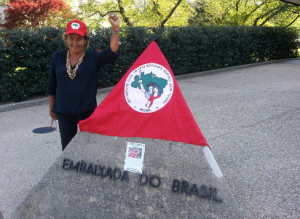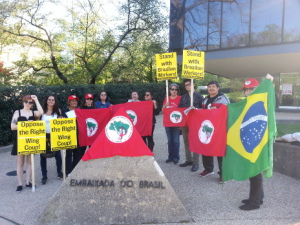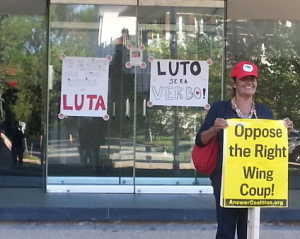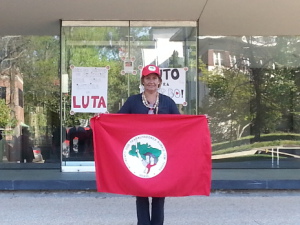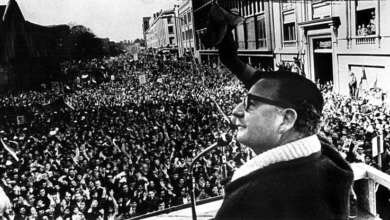April 17 was marked by two major events: 1) the vote in the lower house for the impeachment of Dilma and 2) the 20-year anniversary of the Eldorado Dos Carajas massacre in Brazil.
That day, I had the pleasure of meeting Carmen Diniz from the Collective of International Relations from the Landless Movement of Brazil. We met in front of the Brazilian Embassy in Washington D.C. where a group of activists was holding ground as the representatives back in Brasilia were announcing their votes.
Our conversation touched on parts of Brazil’s history, the agrarian reform, what is happening now with the attempt at a coup, the struggle of the Indigenous people and the times of dictatorship in the past.
Carmen gives us a lesson about struggle that definitely serves as an inspiration for those who are mobilizing in the streets of the United States.
Toya Mileno: Please introduce yourself and tell us why you are visiting the U.S.?
Carmen Diniz: My name is Carmen Diniz. I am part of the International Relations Committee of the Landless Movement of Brazil. I came to Washington for the
journey of actions in solidarity with Cuba that are taking place from April 17-22.
TM: Today is April 17, a very important date. Could you talk a little bit about what happened 20 years ago?
CD: Twenty years ago a group of workers from the Landless Movement were going to meet with the governor of Pará, at the time it was Mr. Almir Gabriel, to discuss some agrarian issues with him.
This group was surrounded by the police. And everyone knows they were following the governor’s orders. There is no way a police chief would attack anyone like this if it’s not by orders from the governor.
This ambush happened at the S curve of the road, the police blocked both sides of it. Today at this place, there is a beautiful monument created by Oscar Niemeyer [famous Brazilian architect who designed the capital of Brasília].
So at this S curve in the south of Pará state, they ambushed the landless workers. They started shooting as if they were hunting animals. The majority of the workers, when they realized what was happening… Because it takes a moment right? When you see a truck from the military police, a car, or a bus, you don’t think that they will come shooting.
So many ran away and hid in the woods. The television started to show a scene right away that was more or less like this: the landless workers running and throwing rocks and sticks at the police. The police at the other side defending themselves from the landless workers that didn’t have any guns. This was what the Globo TV showed all the time, exhaustively. To criminalize the victims.
While in truth, what was happening there at that time was that we had already comrades who were down, either dead or wounded, on the ground. And those workers were going after the cops as if they were attacking them because they were trying to rescue those bodies.
Right at time of the police attack, 19 people were killed. The next day the number went to 21. Others died later as a result of the attack, became blind, some lost a leg or an arm..
We won the land and the farm was named Eldorado dos Carajás in memory of the massacre.
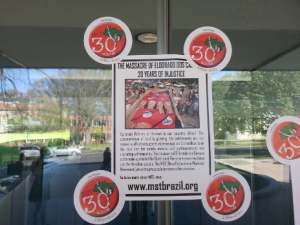 Flyer pasted at the doors of the Embassy of Brazil.
Flyer pasted at the doors of the Embassy of Brazil.
From all the people killed the one that was remembered the most was a 16-year-old boy, Oziel Alves, for whom many camps from the movement were named. Until today, people, when they do an occupation of land, name their camp after him, Oziel Alves.
Oziel was taken alive to a police station, this skinny 16-year-old boy. The cops would hit him with their guns in his head and say, “Chant now ‘MST is great!’” and he would chant, “The MST is great!” “Chant now ‘the struggle is great,’ chant the MST songs!” And he would sing them, and every time they would hit him until he was dead. They tortured him while he was bleeding wounded by a bullet.
TM: And no one was arrested?
CD: No. There was a trial, lawyers came, very good ones, famous ones, who helped us pro bono. They would come to help with the defense. The colonel was charged, Mário Colares Pantoja. The governor, Gabriel, I think had died already.
The colonel, who was in command, Pantoja, was sentenced to over one hundred years in jail, but was never arrested. I think he has died already because he was very old when the sentence came, 70 years or something, and was sent to house arrest. So, the fact is that no one was punished and that allows them to keep killing landless workers.
In the Pará state where this massacre took place, it’s still the winner on the number of deaths in the countryside, result of agrarian conflicts, of squatted land and other conflicts related to the land in this region. So we see no punishment and this is how it is in Brazil.
I like to talk about this because it is a good example. All around Latin America, they judged the militaries for their crimes during the dictatorships in Chile and Argentina, while we never did it in Brazil. In Brazil we had this amnesty [for ‘both sides’], as if anyone from the left would have tortured someone. Because torture is something unforgivable, it is done in cold blood. And that is why we keep seeing these cases. These and many others, like the two landless workers killed the other week in Paraná. Why? Because there is no punishment for those who kill.
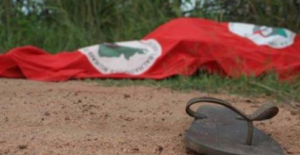 Campesinos members of MST killed in Paraná, Brazil
Campesinos members of MST killed in Paraná, Brazil
TM: This torture is rooted in our country’s police. And at the journey of struggles that you are here for, people will be protesting the School of the Americas who were the ones who taught the Brazilians how to torture and this has taken root in our country since then.
CD: It’s so rooted that the number of young people you see … Brazil has numbers that are similar to war numbers: 55,000 young Black kids are killed every year in Brazil. This is a statistic of war and this country supposedly isn’t at war. Unless you are talking about the class war that we live.
So it is very important to remember, we can’t forget, this is the history of “Torture no more” [group created to denounce the torture during the dictatorship]. We must remember so we don’t forget and don’t let it happen again.
Because it still exists, there are many tortures done by the police in the poor neighborhoods, in the favelas and in the countryside.
That is why we must remember, we must remember the day, remember the victims. We must remember their names. That is why I am here, I am talking with you.
We are here sitting in front of the Brazilian Embassy and we are remembering Eldorado dos Carajás because of our comrades who were killed. Those 21 who were killed during that massacre deserve that we are here so their struggle is not in vain. For the dead, every day will be a day of struggle. Not one minute of silence, but a whole life of struggle, is what we say.
It doesn’t mean that the fact that we are here protesting for Eldorado dos Carajás is not a protest against the federal government. It is important to make it clear because the error here is with the state government in this case. Of course, the executive could have done something for them to be punished.
Especially Dilma, a woman who was tortured during the dictatorship. But it is very important to make it clear that the Landless Movement does not support this coup orchestrated by Eduardo Cunha, Michel Temer, the agro-business and the “BBB stand” [BBB stands for Bull, representing the cattle industry, Bullet, Bible], which is how the group of representatives who are motivated by those three things are called.
TM: And today, the MST is in masses in the streets of Brasilia and the whole country.
CD: In Rio and Minas.
TM: And unfortunately, it has also suffered another repression.
CD: That’s right, as always, another repression. But we are not out there to defend Lula or the Workers Party. We are out there to defend democracy. This is what is at stake. If Aecio didn’t win the elections, I am sorry, he will have to try another election in 2 years.
This can’t become a thing, ‘I don’t like the government, I will remove it.’ It can’t be like that. 54 million people voted for Dilma. We must respect that.
You can’t remove a government just because you don’t like it. This creates an insecurity inside of the institutions.
TM: Can you give an overview about the movement, the agrarian situation in Brazil, for the U.S. public to learn a little bit more.
CD: I think it is important to talk about the agrarian situation. So people can have an idea of it because Brazil never did the agrarian reform. Never. When Brazil was… I don’t like to say ‘discovered’, right?
But when Brazil was ‘founded’ as a western country, the Indigenous population who are still fighting for their land and many are being killed for that. They are in the same struggle as us. That is why we must support their fight. And they are also defending democracy. They are against the coup as well.
It is very important to talk about the Indigenous struggle because their population has grown in the past years and this is very good. It means they were not able to kill all of them, which is great. In many countries you don’t even see descendants of Indigenous people anymore. It is hard to see. Even here in the U.S., it is hard.
And in Brazil, we have achieved one million Indigenous people, which is a very cool thing. But then you go to Mato Grosso do Sul, which is a state in the center-west of Brazil, border with Paraguay, where the Guarani-Kaiowá people are.
I wrote a paper about it that I presented in Cuba in January. This place has a higher number of suicides than in any other place in the world. It is impressive the number from 2010 until today, we had over 700 cases. And the majority are young people. They kill themselves because they are losing their land to the agribusiness. The soy, cattle, sugarcane plantations are destroying the forest.
Because all the forest we still have in Brazil, we owe to the Indigenous communities. What we still have in the Amazon is because of the Indigenous communities who live there, who are reproducing and growing, so the tribes grow as well, which is wonderful.
The agribusiness could co-exist with the Indigenous communities and with the family farming. There is no need for fighting. The greed is what creates this fight. It is the lack of respect for the environment. This is not a video game where you can accumulate lives. This planet doesn’t have the ‘out there’, when you say ‘throw it out there’, the trash, out there where? In space?
This is good for the people here in the U.S. to think of because this country has a lot of consumerism. Everything is disposable. We have islands of trash in the ocean. What we will do with that? We will throw it out there where? In space?
TM: This is affecting the people here in the U.S., for instance, I went to central California where the people haven’t had water for over a year now. Where campesinos, immigrants, live. And the politicians don’t care at all. There is no more underground water for the people and the little that is left is being used by agribusiness. There is no regulation by the government to control its usage. I think this population will never have water again.
CD: They will, they will. Didn’t Bolivia get their water?
TM: With struggle, they will.
CD: The only way to make things happen is through the people’s struggle. I am 100 percent convinced of it. Because we would not be here talking about the agrarian reform if there was no landless movement in Brazil. No one would be talking about it, about agrarian reform.
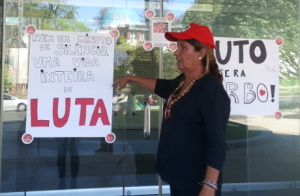 Carmem pointing to poster that says “struggle”.
Carmem pointing to poster that says “struggle”.
What I mean is that no one would be talking about agrarian reform if there wasn’t a movement that is out there fighting, dying, in the name of the agrarian reform.
So people can have an idea of what is the agrarian reform situation in Brazil, a country that never had one, that had a military coup because the president at the time said in a speech that he was going to disappropriate 10 km around the roads in the country. He was taken down the next day. The agrarian reform issue is very strong in Brazil. The landlords are the lords of life.
TM: What is the statistic? 3 percent?
CD: No, it’s one percent. One percent of the population owns 48 percent of the productive lands in the country. Because you don’t count forests like the Amazon in this. So, 48 percent of the productive lands. So, if you take a pizza and you cut half of it and give it to 1 percent of the population and the other 99 percent eats the other half when it has the other half. Because it is a very urban country, many people move to the cities.
This is how it is, the disproportion. While 70 percent of the food the Brazilians eat every day comes from family farming, this 1 percent will plant soy to feed pigs in Japan. That’s how it is.
They are planting sugarcane for ethanol, which pollutes more than you think. Besides being the worst workers’ exploitation type of plantation. Or the eucalyptus to make paper. Then they say they are reforesting with it. It’s a lie! Eucalyptus forests are the silent forests without any animals living in them. And they are cutting earlier than before. They used to cut the trees every 14 years, now it’s eight.
That is why on April 17 a couple years ago, our comrades invaded a paper factory saying, “We don’t eat paper!” The women took over the factory in Rio Grande do Sul, the landless women. It was all over the media because there was research they were doing to be able to cut the trees earlier. So what do they show on TV? A scientist crying because she lost her research.
But what about the landless people who were killed? No one cried for them! What about the children that die of hunger in this country? We can’t have hunger in Brazil! Such a great country with a wonderful climate where you can harvest grapes twice an year! And I am only talking about grapes, but this is the country where ‘you can harvest anything’, they say.
It is a beautiful country with great land and where 80 percent of the people are in the cities. For what? To live in the favela … because the city can’t fit everyone. There are not enough jobs… And what comes with it? The violence. If you put a bunch of mice in a small space, they will start to become aggressive against one another. It’s what happens. And we have so much land, if you drive through our roads, you see so much land.
Drive from Rio to Sao Paulo! You see forest both sides all the way! Lets divide. Because it would be great to have it for everyone. But you need the political will.
TM: I would like to ask you to leave a message to the American people, since this will be the audience that will be reading this interview. You spoke of the importance of struggle, right? If the MST wasn’t fighting for agrarian reform, we would not be here talking about it. Can you leave a message about the importance of the struggle?
CD: I just arrived and I believe that only the American people know where “tightens the callus,” where things are harder in their lives. But I think that the racial issue here is very strong. So the issue I would like to leave a message for the American people is the immigration issue. Because there are no borders right? All this was created by us, but we all have the same red blood. We are all equal.
So I think the message is for the end of bigotry and discrimination. I think this is very important because I don’t think that the USA deserves a Donald Trump, for instance. It will be an absurdity if he wins. His speech is full of hate against the immigrants—immigrants that didn’t take anyone’s job.
TM: What took the jobs away were the free trade agreements, right? That took the factories to Mexico…
CD: That’s right. And we will explore another people? One people explores the other? Brazil has some of that. The countries that are our neighbors are afraid of this ‘sub-imperialism’ as they call it because Brazil is too big. Brazil has factories, a big industrial park. Because it has an enormous population. So the other countries are a little afraid of this ‘sub-imperialism,’ which is something I should take my hat off for Lula.
Because during Evo Morales’s first election, when Petrobras, which is a multinational for them, when they said they were going to nationalize it, the same Brazilians who wanted to privatize Petrobras went to Lula telling him he ‘must do something.’ And Lula said, “They are the ones who make the decision.” So with such declaration, he showed that Brazil won’t play this power and influence game!
If Brazil has more money and can buy energy from Paraguay because Paraguay doesn’t consume as much energy [from Itaipu hydropower]. Why not? If we can, especially if we are in need of more energy.
We killed a great part of the male population of Paraguay, back in the Brazil-Paraguay war. We have a big debt with them as well as with Africa. Lula used to say that we also had a big debt with our brothers and sisters in Africa. And we do!
TM: I will give you a statistic from the United States. Nearly 17 percent of those between the ages of 16 and 29 are neither in school nor working. The education debt is bigger than the credit card debt. There are not that many options for the youth here. If you look for education, you will retire in debt. If you don’t, you work multiple jobs in the service industry, if you get work. This is the situation for the youth.
CD: You must organize! This is my message from my experience of over 20 years with the MST.
They have the money. We have each other so we must organize. We must leave aside vanities and organize. Because only the organized people will win this.
TM: Thank you very much Carmen.


